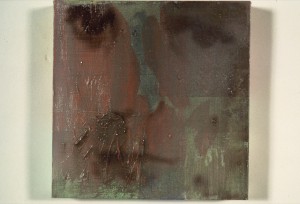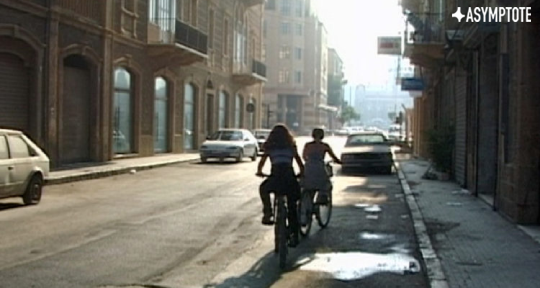In the past few months, we’ve been forced to dwell on our place in the world in the light of extraordinary circumstances. As most of us experience a certain degree of forced isolation, we predictably turn to literature, in hopes that its wisdoms will enable us to regard our realities with increased awareness, understanding, and presence. In this following essay, writer MK Harb takes us through the various manifestations of isolation as seen in Lebanese literature, and more specifically via two extraordinary texts by two Lebanese-American authors, Rabih Alameddine’s An Unnecessary Woman and Etel Adnan’s Sitt Marie Rose.
“During these unprecedented times . . .”
I have heard and read this line over a thousand times since the pandemic began. In a fortnight, we have entered an echo chamber in which a voice is constantly screaming “unprecedented times” at us. Sometimes this voice comes in the form of an email, other times a news clipping, but mostly, it speaks to us as a marketing gimmick. Countless products remind us that these times are in fact unprecedented as they encourage us to buy sanitization stations, virtual university booths, luxury hazmat suits, and other products that commercialize placebo. Maybe the academic part of myself hates the word unprecedented; I have found that the cynicism of academia manifests in teaching that every time is precedent. From pandemics to famine to injustice, it has all been here before.
What is unprecedented in our current cataclysm is our collective online grief; from Zoom calls to Skype sessions, it has never been more ravenous and visible. However, after a while, one realizes that this excessive online engagement numbs the mind more than reassures it. Instead, resorting to literature has been one of the few escapes out of the confines of my living room to more alluring worlds. From Yasmine Seale’s new translation of Aladdin, to Toni Morrison’s The Bluest Eye, and Garth Greenwell’s Cleanness, I feel the intimacy of reading and caressing a text much more deeply than that of a video call. During these literary excursions, I discovered the omnipresence of isolation as a theme in contemporary Lebanese literature. The irony of this discovery was not lost on me; the isolation of a pandemic led me to isolation in fiction.
As I drew out these conceptual maps of society’s outcasts, I noticed their versatility. Sometimes it manifests in the trials and trepidations of a gay man in Hoda Barakat’s The Stone of Laughter, in which the character navigates a war-torn and derelict Beirut from his lonely apartment. Other times this isolation results from the acts of resistance and radicalism, as in Emily Nasrallah’s The Oleander Tree, which takes place during an epoch when the protagonist Rayya resists the feudal and patriarchal roles set for the women of her village. However, two authors in particular were naturally and strongly united in this theme: Rabih Alameddine and Etel Adnan.
On the surface, it would seem obvious to compare the work of the two. Both are Lebanese-American queer authors, and both are aesthetes who thrive at the junction of poetry and art. In this case, what brings them together are the two extraordinary characters they have written. The first is Aaliya from Alamedine’s An Unnecessary Woman, and the second is Marie-Rose, a protagonist from Adnan’s novella Sitt Marie Rose. The uncanniness of these two characters is that they are strangely similar in their personality, yet strongly different in their ideological pursuits. Both Aaliya and Marie-Rose traverse a war-torn Beirut so eerily interchangeable that one cannot help but think they crossed paths in some terrazzo-tiled apartment.
Beginning with Aaliya, she is a snobbish and staunch woman who lives alone and spends her time translating texts into Arabic in her large Beiruti apartment. Much of what we know of Aaliya emerges from her internal monologues with herself and the literary texts she translates. Rendering countless writings, from War and Peace to W.G. Sebald’s The Emigrant into Arabic, we come to realize that Aaliya’s unwavering dedication to translation is not escapism, but rather an almost monastic life calling. Sequestered in a dreary apartment and in a Beirut that has succumbed to Guernica-like carnage, Aaliya remedies this isolation by having intellectual and linguistic conversations with authors dead and alive. Even after the war ends, her versatility and ability to be in touch with the world of literature is extraordinary, reading contemporary authors from Junot Diaz to Nurrudin Farah.

copyright Rabih Alameddine, 2016
Yet, there is a provocative secret to Aaliya’s laborious acts of translation: they are all for her. While she gives us an insight into her systems of translations, declaring: “I decided that since some Lebanese can read English or French, I wouldn’t translate writers who wrote in those languages.” Yet, the audience is merely fictional and she offers the Arabic manuscripts to no one. Folded up in her apartment, the translations do not become an archive, but an amorphous collective in which different parts of her wit and labor exist. For many reading today, this might seem odd, especially as we live through our own isolation of social distancing and quarantine—why would Aaliya deny herself the pleasures of sharing her work with others? However, for her, the joys of life are not lived in the company of others. Destined to reside in a city engulfed with anguish and belonging to a family reeking of hatred, Aaliya detaches from everyday life into a more worthwhile fictive one. Her ways remind us of the system that acclaimed Indian author, Arundhati Roy, adopts while writing. In an interview with The Guardian, Roy declares: “Everyone thinks I live alone, but I don’t. My characters all live with me.” She explains that her characters visit her, and that she engages in thoughtful conversations with them—conversations that often become dialogues in her novels. Aaliya goes through similar spectacles, with authors such as Vladimir Nabokov insidiously entering her dreams, and indulging in heated conversations with Fernando Passoa about his romantic debacles with Ofélia Queiroz. Hence, Aaliya’s peculiar systems of translation and isolating mode of living challenge our notion of collectivity and loneliness; they exist in a space in which literature is immemorial and lived.
Moving on to Marie-Rose, she comes to us from similar pangs of isolation, yet under much more grueling circumstances. She is as curious and intellectual as Aaliya; however, she is a virtuoso of radicalism more so than literature. Marie-Rose is a teacher of Syrian origins who acts as a social worker in the Palestinian refugee camps of Beirut during the onslaught of the Lebanese Civil War (1975-1990). Believing in a humanistic vision of society and defying patriarchal expectations of her womanhood, Marie-Rose becomes a traitor during the war; her support of the Palestinians as a Christian meant a grave violation against the identity politics of the time. If the literary text haunts Aaliya, death haunts Marie-Rose. And if Aaliya’s isolation unfolds through literary acts of translation, Marie-Rose’s isolation is from the cost of defying hegemonic ideology.
Marie-Rose introduces us to her Beirut through the prism of class politics. In the opening lines of the novel, she talks to us about Mounir, a bourgeois Christian Lebanese who would soon turn to the militia. While Marie-Rose frequents his elite world, she also often critiques it, commenting on its consumerism and archaic gender roles, and casting Mounir and his men in a world governed by ennui and an obsession with virility. Her critical gaze of society and her friends sets the scene for a pre-war Beirut divided between engaging in mimicry with a Western-oriented Lebanese elite, and an Eastern-oriented vision in which Islam, Arabism, and pro-Palestinian solidarity converge. Through her uncompromising lens, she reminds us that isolation often accompanies transgression, but also that separating from our immediate community does not mean loneliness. A vagabond of her time, she defies rigid norms of kinship, community, and belonging, as she chooses to join and create communities that are in line with her values. Marie-Rose does not want to belong to Beirut, she wants to be—radically so—in Beirut.
Aaliya’s and Marie-Rose’s Beirut is desperately poor and flagrantly luxurious at the same time. They give us an assemblage of a “war-rich” elite that spend with a ravenous appetite, purchasing self-flushing toilets and hiring foreign house cleaners. Marie-Rose in particular understood that Beirut has become an urban behemoth, driven by real-estate capitalism and adorned with construction cranes. The noises of construction wage on as the sounds of war detonate. Calling Beirut the “center of all prostitutions,” she shows us the increased privatization of space, telling us that “cement has mixed with the earth, and little by little has smothered most of the trees.” Aaliya, like Marie-Rose, also personifies Beirut as a courtesan, saying: “Beirut is the Elizabeth Taylor of cities: insane, beautiful, tacky, falling apart and forever drama laden.”
We come to discover that Beirut is also viciously unequal in its treatment of them both. Marie-Rose vanishes from Beirut in a much quicker manner than Aaliyah, and does not retain the right to see her city transform. As the Lebanese Civil War progresses, her choice to live in a Muslim part of the city and her social activism for Palestinian refugees marks her for erasure, as her very existence threatens the dominant ideology and strikes fragility into sectarian and class lines that militants believed to be all-powerful. Soon enough, the gaze turns from that of Marie Rose upon the city to that of militias on Marie Rose. Unsurprisingly, the militias who abduct Marie-Rose are Mounir and his friends, though it is hatred now that galvanizes their violence, and not the bourgeois restlessness of earlier days; her abduction is a common tactic that aggressors use against their own community when they violate its politics. The militia knew that Marie-Rose has joined a progressive crowd—teaching, socializing, breaking bread, and volunteering with them, and thus wanted to externalize her despair, and the only way to do so was to erase her from the city. For Marie-Rose, however, this erasure did not mean loneliness, nor did it mean falling into the trappings of a victim. Even after her kidnapping, she maintains the same disdain for their habits and ethical choices. Looking back at them in total disregard, we hear Marie-Rose ridiculing her abductors, saying, “I’m caught in their trap and now here they are with all the indecency of armed men before someone who’s not. They hold absolute power that is as cold as their guns. I’d rather talk to their tommy-guns; they’d be less repugnant to me.” But even as Marie-Rose is isolated from her community in Beirut, her conviction still holds strong. She does not choose to bend to their seditious will or apologetically revert into the politics they espouse. Marie-Rose realizes that seclusion and the risk of death are much more worthwhile than living as a conformist in an orchestra of violence.

copyright Sfeir Semler Gallery, Etel Adnan, 2012
Despite the drastically different roles Marie-Rose and Aaliya take on in the war, they both find themselves in strangely similar entrapments with boys prematurely (and violently) transformed to men. During the war, Aaliya—a widow—does not engage in romantic pursuits or platonic friendships. However, she does tell us about a Palestinian boy whom she met in 1967, describing him as “lanky and wispy, a character out of a Chekhov story . . .” He becomes a literary confidant of Aaliya’s, reading and discussing texts in the bookstore where she works and assisting her freely in chores. Nevertheless, their bond is short-lived.
After the killing of Palestinians during the events of Black September in 1971 Jordan, Ahmed vanishes and Aaliya hints at his ideological transformations, telling us that the killings “probably convinced him that books would not open the door to his cell. In this world, a cause could . . .” Aaliya loses touch with Ahmed for years, until one day he pays her a discreet visit. Walking into her bookstore unannounced, Aaliya observes that he “reeked of testosterone” and that “the army pants were no longer the cheap kind.” She then realizes that Ahmed had risen up the societal ladder of the war elite, quickly shedding the innocence of his youth. She is crushed. However, aware of his newfound role as a butcher called the “Mutannabi” and worried about the increased dangers of the war, Aaliya pays a visit to Ahmed in order to request an “AK-47” for her safety. Ahmed, reveling in the role reversal between them, gives her the gun without taking money. Instead, he tells her: “You know what I want.” Shocked at how his naiveté adolescence has turned into a lustful virility, Aaliya questions why he would want sex with her, asking: “Why? I was a mess. I stank of sewage. I looked like a witch from Hansel and Gretel.” However, Ahmed only sees beauty in her and treats her with a mother-like reverence. Eventually, in exchange for a hot shower and a gun, Aaliya offers her body to Ahmed. Despite the superficial closeness of an intimate act, this encounter with Ahmed is not born out of a yearning for love or community. Aaaliya does not want to feel at home with a lover; she wants to ensure her mode of life—translating on her own—survives.
Marie-Rose goes through a similar experience fraught with nostalgia and knotted with damaged men, yet along differently scripted lines. After his party abducts her, a star-struck Mounir tells Marie-Rose: “I must be dreaming. Sixteen years could not have passed since I left my first man’s kiss in your hair.” He then confronts her for being a traitor and working for the Palestinian resistance, and we discover that his memories with her alarm him more than her supposed acts of treason. Marie-Rose, unfaltering, retains her wisdom and defends the Palestinians, asserting that she works with them because “they were on vulnerable ground,” and continues to scold Mounir while yelling: “Someone killed their poets while you were off hunting. Someone killed their political leaders in their sleep . . .” She refuses to abide by Mounir’s limited conception of home and country, and unshackles herself from the binds of his Identitarian rhetoric. Nevertheless, Marie-Rose is no longer a person in his eyes; all he sees in her is the ideological embodiment of a nemesis tainted with nostalgia. She is an existential threat both to his manhood and to his systems of ordering society. We realize that isolation grips and tantalizes Mounir much more than Marie-Rose, that he suffers from a suffocating loneliness Marie-Rose never spoke off, despite the various calamities she endured.
Characters such as Ahmed and Mounir arise from a society rocked by the intermarriage of patriarchy and nationalism—they lust over these women, yet fear and revere them simultaneously. They escaped to artillery to assert their manhood and perform in the pornography of war. One wants to conquer the female body and the other wants to end it. But the irony of these men is that they understand that both Marie-Rose and Aaaliya know there is more to life than the body in pain. They are vagabonds and intellectuals, and they tantalize because of their radical difference from the norms of society. They teach us that isolation is negligible when one is in pursuit of higher callings. They traverse a city at war with a certain peace and belief that many of the men around them cannot fathom, living isolated lives with rich spirits. They also expand our ideas of belonging, shattering outdated and gendered definitions of family and community, having chosen a life of meaning that meant divorcing biological and societal conventions of community living.
What is more important, however, is that this life is not divorced from beauty. Despite their preoccupations, be they literary or ideological, they both pause and capture love during calamity. Marie-Rose describes a sunset, calling it “marvelously intense,” and Aaliya reflects on a sunrise, how “the sun multiples its effects on the myriad of windows and glass in colorful reflections that make each morning distinct.” In both journeys, time elapses, yet moments are expansive. We live their dread, hear their thoughts, believe their words, and laugh at their biting commentary. Marie-Rose and Aaliya teach us that isolation and exile are commonplace, but loneliness is felt most by those who are busy being at war with themselves.
MK Harb created this mix-track to serve as a musical companion to the article.
Image credit: Lamia Joreige
MK Harb is an anthropologist and writer. He received his Master of Arts in Middle Eastern Studies from Harvard University. His work is published in BOMB Magazine, The Times Literary Supplement, Hyperallergic, Art Review Asia, Asymptote, and Jadaliyya. He is currently working on a collection of short stories pertaining to the Arabian Peninsula.
*****
Read more on the Asymptote blog:

